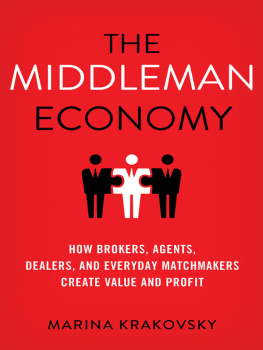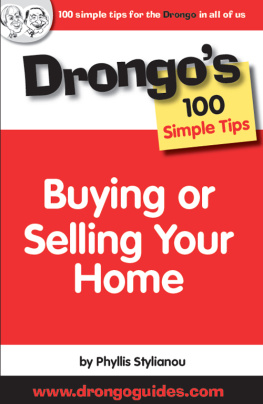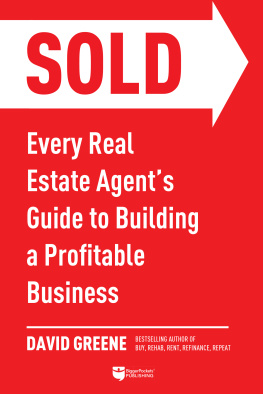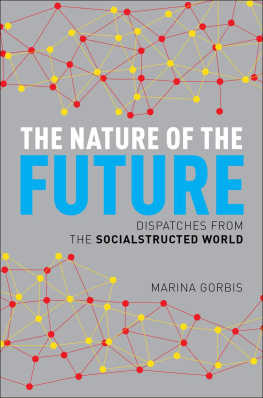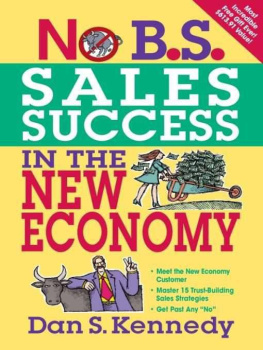THE
MIDDLEMAN ECONOMY
THE
MIDDLEMAN ECONOMY
How Brokers, Agents, Dealers, and Everyday Matchmakers Create Value and Profit
Marina Krakovsky


THE MIDDLEMAN ECONOMY
Copyright Marina Krakovsky, 2015.
All rights reserved.
First published in 2015 by
PALGRAVE MACMILLAN
in the United Statesa division of St. Martins Press LLC,
175 Fifth Avenue, New York, NY 10010.
Where this book is distributed in the UK, Europe and the rest of the world, this is by Palgrave Macmillan, a division of Macmillan Publishers Limited, registered in England, company number 785998, of Houndmills, Basingstoke, Hampshire RG21 6XS.
Palgrave Macmillan is the global academic imprint of the above companies and has companies and representatives throughout the world.
Palgrave and Macmillan are registered trademarks in the United States, the United Kingdom, Europe and other countries.
ISBN: 9781137530196
Library of Congress Cataloging-in-Publication Data
Krakovsky, Marina.
The middleman economy : how brokers, agents, dealers, and everyday matchmakers create value and profit / Marina Krakovsky.
pages cm
Includes bibliographical references and index.
ISBN 9781137530196
ISBN 1137530197
1. Brokers. 2. Distributors (Commerce) I. Title.
HF5422.K717 2015
381.2dc23 2015007978
A catalogue record of the book is available from the British Library.
Design by Newgen Knowledge Works (P) Ltd., Chennai, India.
First edition: September 2015
10 9 8 7 6 5 4 3 2 1
Printed in the United States of America.
To my family
CONTENTS
INTRODUCTION
NOBODY LIKES A MIDDLEMAN, BUT MOST OF US ARE MIDDLEMEN
IN JANUARY 2014, AFTER PRESIDENT OBAMA DELIVERED his annual State of the Union address to Congress, several Republican senators responded with predictable disappointment. One detractor, Mike Lee, the junior senator from Utah, focused his carefully prepared critique on what the government should do to make the American Dream a reality for more people. To show that the president had failed to keep his word about the problem of income inequality, Lee said that for the past five years, the president has promised an economy for the middle class, but all hes delivered is an economy for the middlemen.
It wasnt clear who these middlemen wereLee didnt explain
If you look more closely, though, you see that a huge number of people are in middleman professions, even if they avoid the word. The US Bureau of Labor Statistics tracks the obvious middlemen, those professionals who connect buyers with sellers. These are the millions of people in jobs like sales rep, real estate agent, financial advisor, headhunter, and insurance or mortgage broker. Whats more, many other jobs in our complex economy have a less obvious middleman component. Think of wedding planners, those stylish and ultra-organized women and men who orchestrate the big event and help keep the bride from becoming bridezilla; that doesnt sound like a middleman jobuntil you consider all the vendors (such as the florist, the baker, the wedding-gown maker) who must be carefully selected and, equally important, held to the highest standard of their professions. Lawyers, too, act as middlemen when they broker deals. Your family doctor is a middleman when she refers you to a specialist or, more often, prescribes one particular drug rather than another: if your health insurer is a middleman between you and your doctor, your doctor is a middleman between you and the drug maker. Even as a reporter, I often think of myself as a middleman between the many people who have information to offer and my readers, who count on me and my editors to deliver only information that is interesting, accurate, timely, and useful to them.
The middleman element in these jobs isnt always apparent to the person doing the work, but it can make the difference between doing a decent job and doing an excellent one. For jobs where the middleman element is the very essence of the job, the effect of playing the role well is even more stark: buyers and sellers have certain expectations of people in a middleman position, and not meeting those expectations can sour business relationships. People rarely express these expectations until things go wrong, but this book lays them out explicitly, identifying the roles middlemen serve and what buyers and sellers expect from each role.
Why Middlemen Are More Important Than Ever
In every age, a new technology seems to herald the end of the middleman: from railroad networks to air travel, from the telegraph to the Internet to social media, each technology brings with it the promise of direct trade. After all, the thinking goes, who needs middlemen when buyers and sellers can communicate directly? In the mid-1990s, no less a tech visionary than Bill Gates proclaimed that the Internet would bring us friction-free capitalism, eliminating the sort of waste that comes when people must drive all around town comparing prices of TVs, for example. Gates expected that the Internet itself (or the information superhighway, as we were calling it then) would become the ultimate go-between, the universal middleman, such that often the only humans involved in a transaction will be the actual buyer and seller.
Why didnt things play out that way? A major reason is the need for trust. Because middlemen have more frequent interactions with buyers and sellers than those people would if doing business without a middleman, they have more opportunities to establish trust with both sides. In no place is this more visible than on eBaywhere, despite the opportunity for buyers and sellers to transact directly, most of the trading flows through trusted middlemen, those sellers who have built up the best reputations over thousands of transactions. We see in eBays early days, for example, the rise of brick-and-mortar services like AuctionDrop and iSoldIt; people trying to make a buck through eBays virtual garage sale didnt list their old Beatles albums and Pez dispensers on eBay themselves but paid these intermediaries a commission of as much as 45 percent to do it for them. Now that eBay has been around for years, thousands of people make their living by buying specialty products and reselling them on the site, the preeminent among them enjoying over $150,000 in sales per month. Even those in the second tier, the platinum-level power sellers, make monthly sales of at least $25,000. These hugely successful sellers, one of whom youll meet in this book, clearly arent selling their own castoffsthey are wholesalers and retailers of other peoples goods. Far from killing the middleman, eBay has generated a thriving new breed.
Its not just eBay. Whats happened on eBay is very similar to whats happened on LinkedIn. Its all about middlemen. Even though hiring managers and prospective employees can find and contact each other through the site, the fact is that professional recruiters are the companys highest-revenue customers, paying more than do all of the job seekers on LinkedIn combined.through buyers and sellers acting alone. Everywhere you look in the sharing economy, from Airbnb to TaskRabbit, Uber, and ZocDoc, right in the center is a middleman business.
So much for the end of middlemen. Of course, there is no question that the Internet has shaken up entire industries and caused the loss of many middleman jobs: think of the stockbroker who merely executes your trade or the travel agent who does nothing more than take your order. But on the whole, the webs growth has actually gone hand in hand with a rise in the middleman class, and economic statistics show that middlemen now make up a larger part of the economy than ever. Daniel Spulber, the Kellogg economist whos studied the matter more than anyone, calculated that back in 1999 middlemen contributed 25 percent to the gross domestic product (GDP) of the United States, already an impressive figure.
Next page
